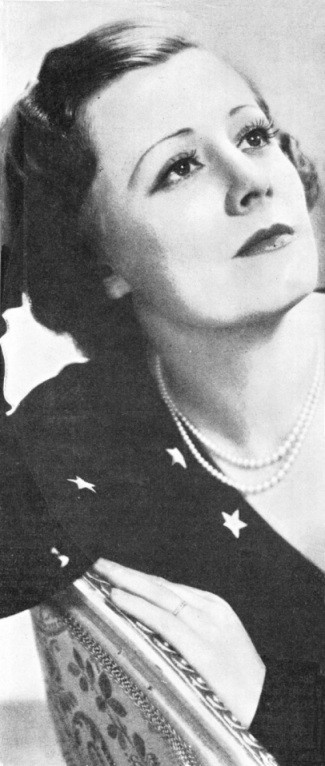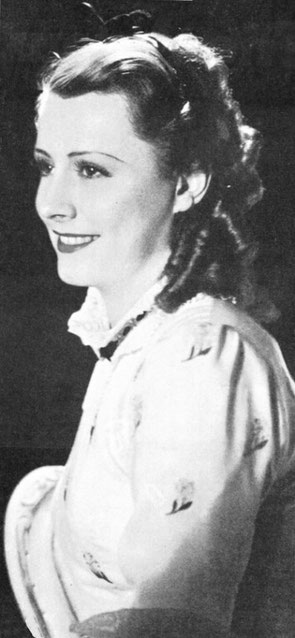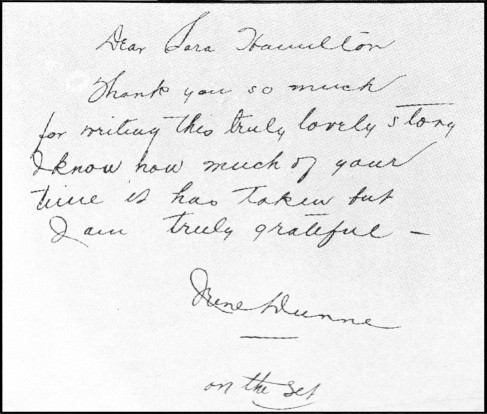This Is Really IRENE DUNNE
Never before has this elusive lady sat for a word portrait so real, so heart-warming, or - as she herself put it - so "truly lovely"
By Sara Hamilton

If you are one of the many, many thousands who have sat in a darkened theater and wondered about the woman Irene Dunne as she moved serenely about a movie screen, this story is for you.
If you have wondered at the quiet calm of her, the halfhidden flame of humor that lies so near the calm surface, if you have noticed the rapt, yes, the entranced eypression of every man, young or old, who sat about you, if you have had a feeling, an intuitive feeling, that those qualities of dignity and sereness have roots in soil born of some necessity, this story then is for you.
I can promise you nothing sensational. For Irene Dunne is not a sensational woman. I can guarantee no juicy bits of intimate gossip. For I know of none. Unless, perhaps, she lies awake nights heartsick about the kitchen sink in her new home. She's afraid it's to near the door. Or would you call that juicy? No? No, I thought not.
But if I you tell Irene Dunne is a woman who magnificently rose from the ashes of the woman she might have been, what would you say to that, eh?
If circumstances of fate or whatever one chooses to call it has suddenly stopped you in the even tenor of your way and shoved you off in a new and bewildering detour where all seems lost and hopeless, it might be well to think long and earnestly about the woman Irene Dunne. For the very qualities that endear her to thousands today, were born of just such an exigency.
I can't say, not being a prophet or seer, and thereby losing a chance for easy pickings in Hollywood, what Irene Dunne might have eventually become in life, but I have even money to lay down it wouldn't have been a movie star. Knowing something of her gentle breeding, of her home life in Louisville, Kentucky, the disapproving consternation of her father at the mere suggestion, coupled with her shyness and complete lack of hardened determination necessary for the work, all climaxed in her one ambition to become a concert singer, I'm sure it would have prevented Irene Dunne from even dreaming of it.
But at the age of twelve her world, her quiet, safe, secure world was lost forever. Irene's father died. At twelve, Irene knew in her little girl heart, it was up to her to provide a secure future for herself, her mother and younger brother.
They went back to her mother's old home where a dozen or so young cousins and nieces and aunts lived. All looked for Irene for some solution to the problem. Irene with her voice and fairness could do something. Eyes, blue, brown, young, old looking day after day to Irene until the sense of responsibility grew up within her like a giant plant crowding into the background all other preconceived ideas, traits, plans and dreams. Even submerging her deep Irish wit that still loiters near the surface. It molded a new Irene Dunne. And because it was taken up with such eager willingness, with such seriousness of purpose, such touching bravery, it became the outstanding characteristic of the woman today. It permeates everything she thinks, says, does. It shows forth clearly from the screen as if it were written in big red letters.
It's the keynote to her soul - this allegiance to her family and work. One inseperable for the other. It's become second nature to her and influences everything she thinks and does and plans for you on the screen.
A lifelong allegiance to a service! The service long since rendered but the allegiance still glowing brightly. Looking after her family with anxious solicitation.
It's distinctly understood among her few intimates that Irene Dunne is meant when one asks after the Mother Hen.
"Well, what's Mother Hen about today?"
One reads from a biography written, no doubt, by some well meaning press agent, that after her school days, Irene Dunne was wooed by Broadway. Her heart was set on the Metropolitan and opera but no, Broadway, in a fetching mustachio, wooed and won Irene.
How cozy. How intriguingly romantic. And how completely untrue.
People, theatrical producers especially, remember Irene Dunne in the days she tramped the pavements of New York looking for work. There was an immaculate neatness about her that hid any trace of shabbiness. There was something so brave about her, one producer later recalled, that one knew here was a girl who would have died before revealing the reason behind the pressing need for work. Or using it as a lever. Here was a girl who wante to become an actress noe because being an actress was glamorous but, with her fine voice and quiet beauty, it was the only work she felt fitted for. "I can shut my eyes now," he related, "and see the gentle quietness of her as she went about the business of job hunting. And I always felt as if I had let myself down when I had nothing for her."
And if that is being wooed by Broadway, I'm just about to give it to Michigan Boulevard.
I'm particular about giving you this background of her in order that you may drape upon ir the following facts, impressions and stories about her and so form in your own mind the complete picture of the woman, Irene Dunne.
I give you, to begin with three ladies of Hollywood. All holiday bent in New York and all attending the same theater. It's after theater time and taxis are honking, crowds are milling and autograph fans swarming the theater entrance for autographs.
The first lady emerges in a swirl of ermine to be mobbed by annoying fans. Ignoring all their pleas, her escort helps shoulder away the clamoring fans until a taxi is reached.
The second emerges to be even more strenously set upon.
"Damn you," she cries, "keep away from me."
The third lady loiters in the lobby. Hoping they'll tire and go home. A half hour, three quarters, and hour goes by. And still they wait. Her husband refuses to let her face the two hour ordeal of signing autographs in a zero night. And yet, Irene Dunne can't bring herself to ignore, to hurt, to appear ungrateful.

At last her car is brought around to the stage door, but they follow. Crowding about the wheels. "I'm so frightened for you. Please keep away from the car," she begs. And finally, as they continue to shove and crowd, she gets out of the car and stands on the sidewalk, among them in the biting cold. "I guess, we'll all have to take cold together," she laughs. "I can't take a chance of hurting you." Gently she reasons with them. "Won't you please go home before you all take dreadful colds? I'm so worried about you."
It won. The sincerity in the voice, the sympathetic understanding was felt in every heart that cold winter night oin a New York sidewalk. They went home and Irene Dunne drove away.
Men like Irene Dunne not only because they see in her the ideal wife, the symbol of gracious American womanhood, the woman ideal, but because she can go to the very devil like a lady. It was men, believe it or not, who were most affected by the faithful shadow in "Back Streets."
"No man likes a woman who is emotionally sloppy," one prominent man of Hollywood explained, "and Irene Dunne never is."
She dreads misrepresentation on paper. "Fans hate a hypocrite," she said. "I believe they detect the real you behind every role and if they are led to believe you are something you pretend you aren't, they resent it."
John Cromwell, the director, says Irene always looks to him like the cat that swallowed the canary. It's the pleased satisfaction with what life has given her shining through that wall of reserve that lends that paradoxical expression to her lovely features. He's quite right about it, at that.
She's terribly hard to know. People for miles around will tell you that tidbit about her. In fact, people have given up her in droves.
There's a wall - a blanket, someone aptly put it - that shields the real Irene Dunne form the world. It's a wall or blanket of shyness, reserve and true humility. It's only when one knows why it is there, that one begins to get a glimpse of the real woman. It's only when one realizes it was built there by Irene's own hand while still so very young to keep a world from knowing about the wildly beating heart, the hopes and fears of the little wage earner who lived on the other side of that wall, that one begins to understand the woman, Irene Dunne.
But few people are very privileged to scale that wall. You could count them. I believe on the fingers of your right hand.
It troubles her to be questioned about the relative merits of living three thousand miles away from one's husband as Irene has had to do during the greater part of her married life. Dr. Griffin's work has necessistated his remaining in New York while Irene's work kept her in Hollywood.
"But why imagine it's an approved or planned arrangement? she wonders. "Certainly I don't even advise it or think it practical for others. It was only circumstances that caused it and now that we're building our new home in California, we'll be together more."
It was almost five years ago Dr. Griffin met Irene Dunne at a dinner party in New York. The next day he dropped into a jeweler friend's shop and asked to see some diamonds. "I want it," he said, "for the lady I'm going to marry. I met her only last night, but I know it will be she or no one."
He carried the ring in his pocket five years before winning Irene. And when she finally accepted the ring, she refused to have the old fashioned setting done over. "This is the way you bought it for me, this is the way I wear it," she said.
That marriage is such a complete success, someone confided, because Irene Dunne is such a trememdous friend to her husband.
Think of that. A friend to one's wife of husband. Love or fondness or companionship we give each other, yes. But do we actually give true abiding friendship that outrides all other human emotions?
Irene Dunne does.
They catch the spirit of gay bravado together. Convinced they were eating too much weight building foods, they went on a sort of a take-away-the-potatoes spree together. And having clung to it throughout the meal, would arise from dinner table, solemnly shake hands, and with a comically formal little bow to each other, depart from the dining room.

As she accepted the man who was to be her husband, so does she accept her friends. Slowly. No one ever hurries Irene into an alliance that might afterwards be regretted.
One particular friend told me she had been four years storming her way into Irene's heart and friendship. "I felt all the time as if I were on probation," she told me. "As if Irene were making sure it was true friendship I offered and wanted in return. And then, after four years in which I had expressed my admiration of her to mutual friends, I walked into a room and she was there. We had never met, but Irene instinctively held out her hand to me in a gesture of good fellowship and I knew I had been tried and accepted."
She has the rare quality of self-conservation. She conserves herself for the few she loves rather than scattering herself about among crowds and groups of people.
Irene Dunne is the kind of woman who can be and is an understanding pal to men. Just as she is a friend to few women. She immediately inspires confidence from everyone. People tell Irene Dunne innermost secrets of their hearts.
"To the grave" is a well known expression of Irene's. And to the grave it is. "You know how it is after you confided something to someone," a friend of hers told me, "and then wished to heaven you hadn't. And how every time they refer to it, which is often, you lament your foolhardiness over again?"
"You never need any such compunction with Irene Dunne. No confidence is ever dragged to the light of passes those lips. To the grave she had said and to the grave and beyond it, it goes."
Her recent celebration of two holidays, or rather one holiday and one anniversary, typifies Irene Dunne more than anything else I know of.
One was her birthday. Surely, this event, if one runs true to form in Hollywood, would have called for a gay party at home or one of the gayer night spots. But Irene had discovered the eight-year-old son of a friend had the same birthday so the two of them sat quietly down to dinner to celebrate.
"YOU know," he told his mother afterward, "we made a pact, Miss Dunne and I. We're to see each other or get in touch each birthday. Even when I'm grown up and maybe way off in Shanghai or some place. We're still to keep in touch." He was thoughtful for a moment.
"Mother?"
"Yes, son?"
"I'll have to be careful the kind of man I grow into if I'm to keep her all my life, won't I? She wouldn't be proud to talk to me if I wasn't. But she would, even if I wasn't for you see, we made a pact together and she'll never break it."
(Photoplay April 1936)
 The Irene Dunne Site
The Irene Dunne Site